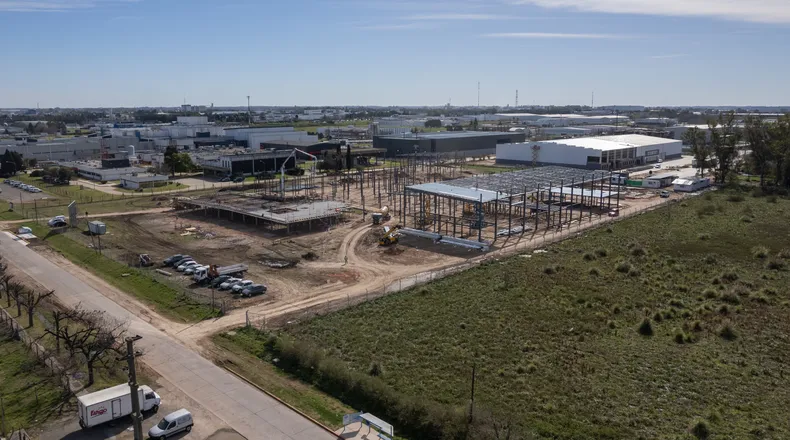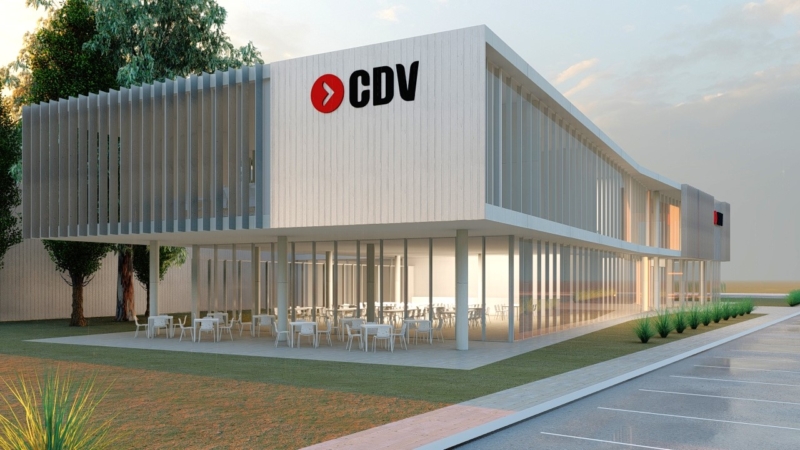CDV advances in the construction of its new veterinary vaccine plant
The veterinary vaccine plant, already under construction, will meet the highest international standards of quality and sustainability. But why?
SOURCE: MOTIVAR
In light of the imminent global increase in food demand, it is essential for the agribusiness and livestock sectors to anticipate how future scenarios will evolve. There is a growing need to improve the sustainable use of natural resources, and some pioneering companies are already building the foundations for this transition. One of them is CDV Laboratory, which is developing an exclusive veterinary vaccine plant that will comply with the highest international standards of quality and sustainability.
Innovation in agricultural practices and the development of sustainable technologies are key to ensuring that this growth in food production is accompanied by practices that protect our finite natural resources for future generations.
The key role of technology and vaccines: CDV’s multimillion-dollar investment in a new green plant and the transformation of its two existing production facilities.
According to the FAO (Food and Agriculture Organization of the United Nations), 70% of the required increase in food production will come from the adoption of technologies. Large companies must address the need to balance environmental care, technological development, and production, without compromising product quality.
The challenge lies in balancing the growing demand for animal-based foods with environmental sustainability in increasingly demanding markets. In this context, livestock farming must adopt more efficient approaches, such as selective breeding, improved animal genetics, and especially intelligent, preventive healthcare through vaccination. These strategies help produce animal protein using fewer resources. Examples of this productive and sustainable efficiency include one calf per cow per year, shorter and more efficient fattening periods, and increased milk yield per cow.
The livestock industry faces the dual challenge of meeting the rising demand for animal protein while minimizing environmental impact. Effective vaccines—reducing disease spread and increasing production efficiency—are essential tools in this equation. It is vital for the sector to embrace these challenges collaboratively and adopt sustainable, responsible practices that can meet global food needs without compromising planetary health.
In conversation with Juan Roô, General Manager of CDV Laboratory, he stated:
“We are advancing in the construction of Plant 3, designed from the outset according to the World Class Manufacturing standards for vaccine production. The facility is conceived with a ‘green industry’ approach, maximizing efficiency in every aspect of its operations.”
He added:
“We have also started converting our other two production plants, also located in the Pilar Industrial Park in Buenos Aires, to be certified for green energy generation. Our goal is to increase production for animal health while preserving the environment.”
Maximizing production for animal health, while preserving the environment
Aligned with this vision, CDV has integrated design, technology, and innovation across its three main pillars: construction, equipment, and efficient natural resource management. According to Gabriel Heffes, Engineering and Maintenance Manager overseeing the project:
“The plant’s layout was oriented to maximize natural light and minimize artificial lighting. Features include a glazed facade with solar protection for energy savings, charging stations for electric vehicles, and clean energy use through photovoltaic panels—all key to an energy-efficient facility.”
He added:
“Another highlight is the incorporation of high-tech industrial equipment with low energy consumption. Water resource optimization will also be a priority, including the use of rainwater reservoirs for controlled discharge and irrigation.”
This initiative will provide a sustainable response to both domestic and international market demands, with a modern structure offering world-class production quality and reduced environmental impact and carbon footprint.
Vaccine Laboratories at the Forefront of the “One Health” Approach
The “One Health” concept recognizes the close interconnection between human, animal, and environmental health. In the heart of livestock production, vaccine laboratories play a crucial role in improving the sector’s productivity and sustainability. The development of vaccines for diseases like foot-and-mouth disease and bovine viral diarrhea not only reduces disease burden but also improves food production efficiency. Preventing diseases supports healthier livestock growth, reduces losses, and minimizes reliance on intensive treatments. Moreover, by limiting the use of antibiotics and other medications, vaccines help fight antimicrobial resistance—a rising global health concern.
The projected total production capacity will reach 280 million doses
On the demanding quality standards of CDV’s Plant 3, Carolina Lecce, Head of Quality Assurance and Biosafety, explained:
“Our new plant, with a total covered area of over 12,500 m², is being designed to meet the most rigorous global standards. For Good Manufacturing Practices (GMP), we follow WHO guidelines as the international benchmark. We are also incorporating criteria from the Pharmaceutical Inspection Co-operation Scheme (PIC/S).”
It is worth noting that WHO includes regulatory authorities from over 50 countries and sets pharmaceutical quality assurance standards that also apply to veterinary medicine in developed nations.
Regarding biosafety, Lecce added:
“We will adhere to the standards of the World Organisation for Animal Health (WOAH, formerly OIE) and the U.S. Centers for Disease Control and Prevention (CDC) for biocontainment and biosafety. We also follow recommendations from the U.S. National Academy of Sciences (NAS) on animal welfare. Nationally, we comply with all SENASA regulations related to vaccine production and biological agent containment. Our aim is to build an infrastructure that not only guarantees product quality and biocontainment but also meets international market requirements.”
The new plant’s investment of USD 60 million enables CDV to manufacture world-class products at competitive costs, positioning the company strongly in international markets.
The total projected production capacity will reach 280 million doses, of which 190 million will be vaccines for cattle (for domestic and export markets), and the remainder for salmonids and other species such as pigs and companion animals. The plant is expected to be operational by late 2024.
SOURCE: MOTIVAR




